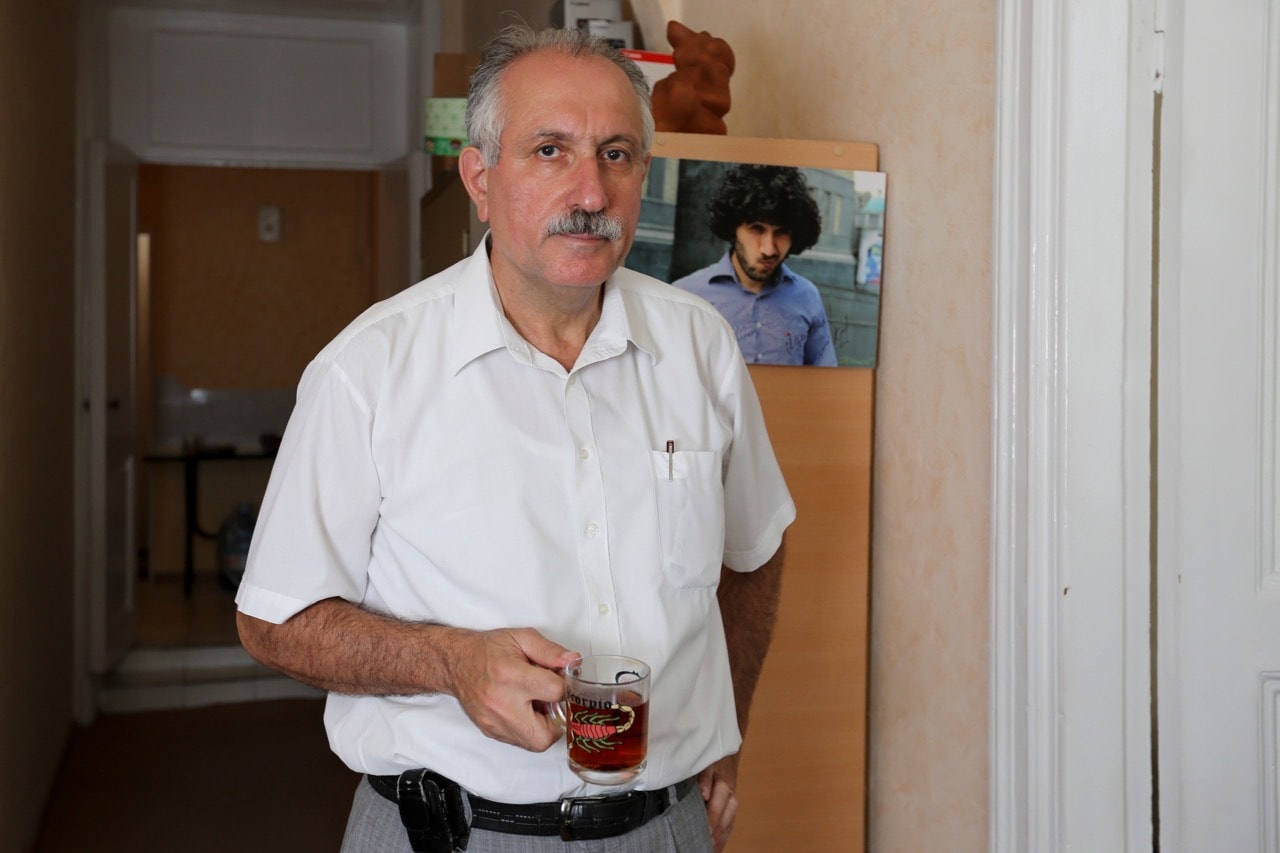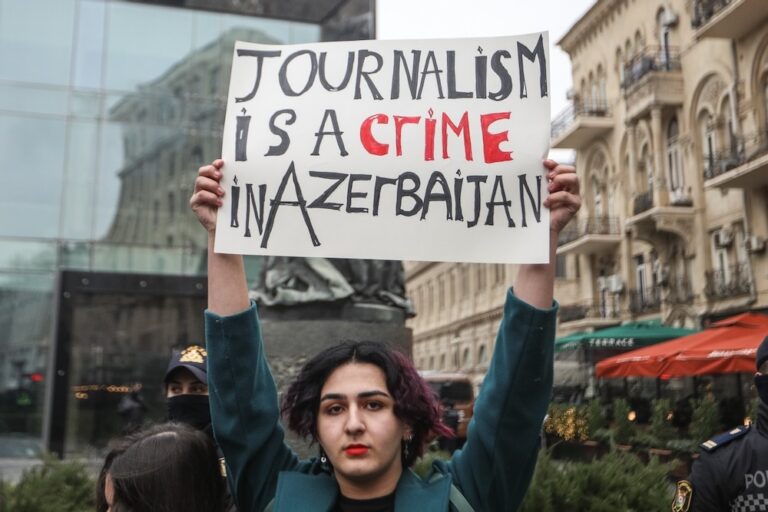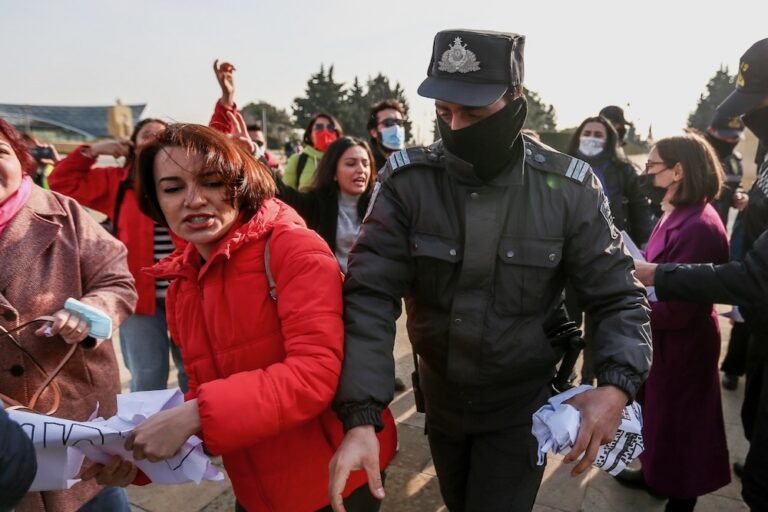Azerbaijani authorities have often used bogus tax-related and other charges to jail critical journalists and bloggers, as seems to be the case here.
This statement was originally published on hrw.org on 25 August 2017.
Azerbaijani authorities have jailed Mehman Aliyev, the director of the country’s last remaining independent media outlet, filing charges on alleged tax and other offenses against him in retaliation for his journalism, Human Rights Watch said today. The authorities should drop the criminal charges against Aliyev and immediately free him.
Aliyev (no relation to Azerbaijan’s president, Ilham Aliyev) is the director of Turan, an independent news agency that has reported on a wide range of political, economic, and social issues since its founding in 1990. On August 25, 2017, a court in Baku placed Aliyev in pretrial detention for three months during the investigation against him on charges of tax evasion, abuse of office, and illegal business activity. If convicted, Aliyev could face a maximum seven-year prison sentence.
“Aliyev, and Turan, are the latest victims in the government’s campaign to erase independent media in Azerbaijan,” said Rachel Denber, deputy Europe and Central Asia director at Human Rights Watch. “Instead of locking up journalists, the Azerbaijan government should just let them do their work.”
Thorbjorn Jagland, the secretary general of the Council of Europe, and the French Foreign Ministry have publicly expressed concern about Aliyev’s arrest and about the investigation into Turan.
The charges stem from an investigation that the Taxation Ministry opened into Turan on August 7. The ministry told media outlets that Aliyev is accused of violating Azerbaijani law on grants, which requires groups to register all grant contracts. The ministry stated that Aliyev bore responsibility for the agency’s failure to register 148,310 AZN (US$87,268) in grants that it received from 2010 to 2014, and for its failure to pay AZN 60,080 (US$35,352) for the period 2010 to 2016.
Human Rights Watch and other groups have repeatedly called on the Azerbaijani government to reform its laws imposing overly cumbersome grant-registration requirements, which allow the authorities virtually unlimited powers to deny the registration of grant funds.
Turan’s bank accounts have been frozen, and its staff announced in a statement that it would suspend its activities starting September 1.
Turan and Aliyev had fully cooperated with the investigation, but authorities raided the agency’s office on August 16, confiscating documents and the accountant’s computer. On August 24, Aliyev went voluntarily with his lawyer to the Taxation Ministry for questioning, in response to a request from an investigator and a prosecutor.
Officials refused to allow Aliyev’s lawyer, Fuad Agayev, to be present, claiming that Aliyev’s status in the investigation had changed from “witness” to “suspect,” and that Agayev would need to get official permission to represent his client. This was not possible because it was the end of the working day. Regardless of the time of day or night, an individual in interrogation custody has the right to a lawyer, Human Rights Watch said.
Azerbaijan has a long record of state antagonism toward independent and opposition media, Human Rights Watch said.
Azerbaijani authorities have used bogus tax-related and other charges to jail critical journalists and bloggers. In July, authorities sentenced Faig Amirli, financial director of the already closed, pro-opposition Azadlig newspaper, to three years and three months in prison. Aziz Orujov, head of the recently-closed Kanal 13 online TV channel, has been awaiting trial on tax-related charges since June.
Aliyev’s arrest and the investigation against Turan are the latest government moves in its vicious crackdown on critical media in the country. Reporters Without Borders ranks Azerbaijan 162 among 180 countries for press freedom. At least eight journalists and bloggers are in prison on politically motivated charges. Among them is Mehman Huseynov, one of the country’s most popular journalists and bloggers, who is serving two years in prison on bogus defamation charges.
Azerbaijani authorities have permanently blocked the websites of some major media outlets critical of the government, and in March amended laws to tighten control over online media.
In its August 25 statement, Turan said that high-level government officials had in recent weeks offered Aliyev “some government-backed ‘financial aid’ for Turan’s operations in exchange of ‘loyalty,’ . . . [and] things became rather complicated when [Aliyev] publicly criticized the government’s campaign” to give free apartments to journalists on National Press Day.
Starting in 2014, the authorities used the same combination of tax and illegal business activity charges that Aliyev is facing against a number of the country’s leading independent human rights groups and their leaders. The leaders were imprisoned, and most were released by 2016. The organizations had to close following spurious tax audits and criminal investigations.
“Who at this point can seriously believe that this is not a politically motivated case to silence a strong, independent voice in Azerbaijan’s deserted independent media landscape,” Denber said. “If the Azerbaijani authorities truly have well-founded financial claims against Turan, there is no reason these could not be sorted out without resort to prison or other excess. It’s not too late for the Azerbaijani [authorities] to come clean, and free Aliyev.”



